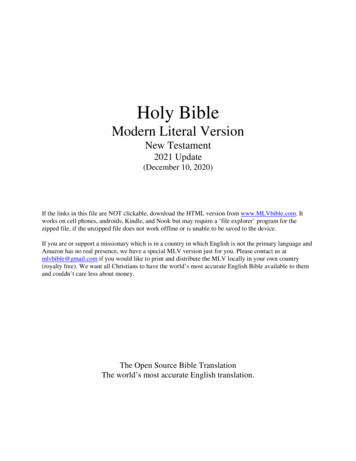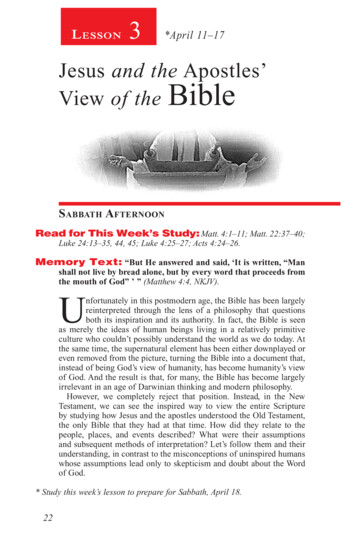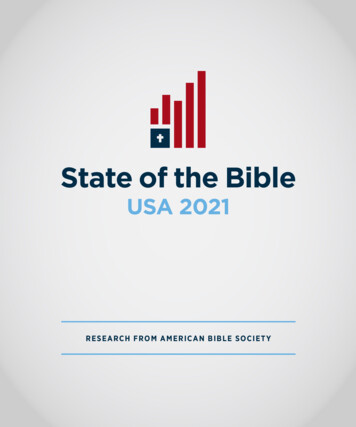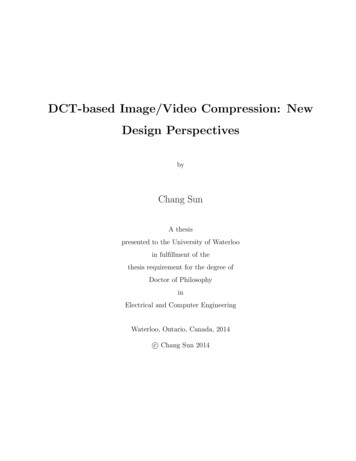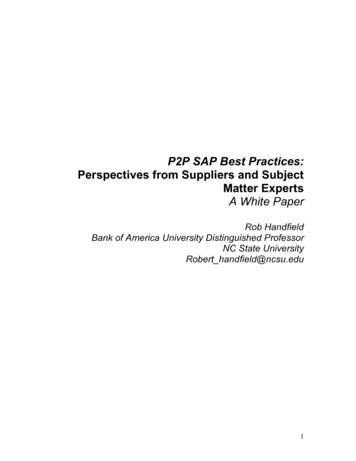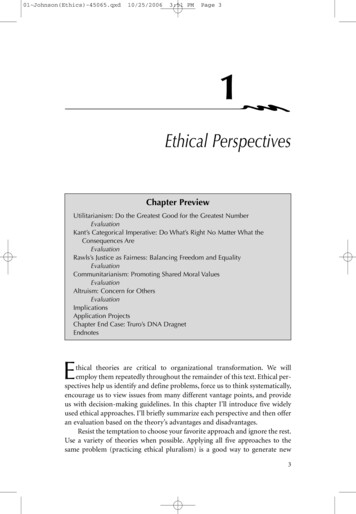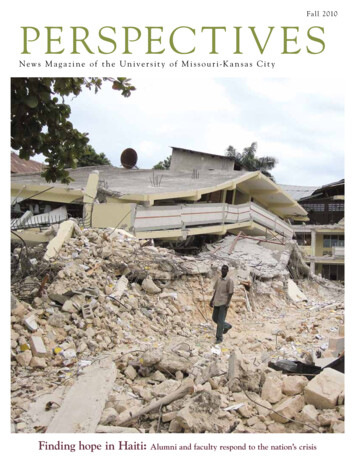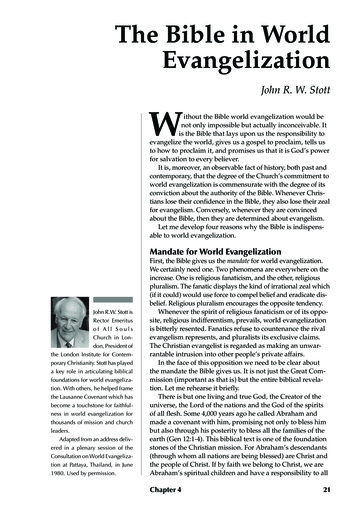
Transcription
The Bible in WorldEvangelizationJohn R. W. StottWithout the Bible world evangelization would benot only impossible but actually inconceivable. Itis the Bible that lays upon us the responsibility toevangelize the world, gives us a gospel to proclaim, tells usto how to proclaim it, and promises us that it is God’s powerfor salvation to every believer.It is, moreover, an observable fact of history, both past andcontemporary, that the degree of the Church’s commitment toworld evangelization is commensurate with the degree of itsconviction about the authority of the Bible. Whenever Christians lose their confidence in the Bible, they also lose their zealfor evangelism. Conversely, whenever they are convincedabout the Bible, then they are determined about evangelism.Let me develop four reasons why the Bible is indispensable to world evangelization.Mandate for World EvangelizationJohn R.W. Stott isRector Emeritusof All SoulsChurch in London, President ofthe London Institute for Contemporary Christianity. Stott has playeda key role in articulating biblicalfoundations for world evangelization. With others, he helped framethe Lausanne Covenant which hasbecome a touchstone for faithfulness in world evangelization forthousands of mission and churchleaders.Adapted from an address delivered in a plenary session of theConsultation on World Evangelization at Pattaya, Thailand, in June1980. Used by permission.First, the Bible gives us the mandate for world evangelization.We certainly need one. Two phenomena are everywhere on theincrease. One is religious fanaticism, and the other, religiouspluralism. The fanatic displays the kind of irrational zeal which(if it could) would use force to compel belief and eradicate disbelief. Religious pluralism encourages the opposite tendency.Whenever the spirit of religious fanaticism or of its opposite, religious indifferentism, prevails, world evangelizationis bitterly resented. Fanatics refuse to countenance the rivalevangelism represents, and pluralists its exclusive claims.The Christian evangelist is regarded as making an unwarrantable intrusion into other people’s private affairs.In the face of this opposition we need to be clear aboutthe mandate the Bible gives us. It is not just the Great Commission (important as that is) but the entire biblical revelation. Let me rehearse it briefly.There is but one living and true God, the Creator of theuniverse, the Lord of the nations and the God of the spiritsof all flesh. Some 4,000 years ago he called Abraham andmade a covenant with him, promising not only to bless himbut also through his posterity to bless all the families of theearth (Gen 12:1-4). This biblical text is one of the foundationstones of the Christian mission. For Abraham’s descendants(through whom all nations are being blessed) are Christ andthe people of Christ. If by faith we belong to Christ, we areAbraham’s spiritual children and have a responsibility to allChapter 421
22Chapter 4THE BIBLE IN WORLD EVANGELIZATIONmankind. So, too, the Old Testament prophets foretold how God would make his Christthe heir and the light of the nations (Ps 2:8;Isa 42:6, 49:6).When Jesus came, he endorsed thesepromises. True, during his own earthly ministry he was restricted “to the lost sheep ofthe house of Israel” (Matt 10:6, 15:24), but heprophesied that many would “come fromeast and west, and from north and south,”and would “sit at table with Abraham, Isaac,and Jacob in the kingdom of heaven” (Matt8:11, Luke 13:29). Further, after his resurrection and in anticipation of his ascension hemade the tremendous claim that “all authority in heaven and on earth” had been given tohim (Matt 28:18). It was in consequence of hisuniversal authority that he commanded hisfollowers to make all nations his disciples,baptizing them into his new community andteaching them all his teaching (Matt 28:19).And this, when the Holy Spirit of truthand power had come upon them, the earlyChristians proceeded to do. They became thewitnesses of Jesus, even to the ends of theearth (Acts 1:8). Moreover, they did it “for thesake of his name” (Rom 1:5; 3 John 7). Theyknew that God had superexalted Jesus, enthroning him at his right hand and bestowingupon him the highest rank, in order that every tongue should confess his lordship. Theylonged that Jesus should receive the honordue to his name. Besides, one day he wouldreturn in glory, to save, to judge, and to reign.So what was to fill the gap between his twocomings? The worldwide mission of theChurch! Not till the gospel had reached theends of the world, he said, would the end ofhistory come (cf. Matt 24:14, 28:20; Acts 1:8).The two ends would coincide.Our mandate for world evangelization,therefore, is the whole Bible. It is to be foundin the creation of God (because of which allhuman beings are responsible to him), in thecharacter of God (as outgoing, loving, compassionate, not willing that any should perish, desiring that all should come to repentance), in the promises of God (that allnations will be blessed through Abraham’sseed and will become the Messiah’s inheritance), in the Christ of God (now exalted withuniversal authority, to receive universal ac-claim), in the Spirit of God (who convicts ofsin, witnesses to Christ, and impels thechurch to evangelize) and in the Church ofGod (which is a multinational, missionarycommunity, under orders to evangelize untilChrist returns).This global dimension of the Christianmission is irresistible. Individual Christiansand local churches not committed to worldevangelization are contradicting (eitherthrough blindness or through disobedience)an essential part of their God-given identity.The biblical mandate for world evangelization cannot be escaped.Message for World EvangelizationSecondly, the Bible gives us the message forworld evangelization. The Lausanne Covenant defined evangelism in terms of theevangel. Paragraph four begins: “to evangelize is to spread the good news that JesusChrist died for our sins and was raised fromthe dead according to the Scriptures, and thatas the reigning Lord he now offers the forgiveness of sins and the liberating gift of theSpirit to all who repent and believe.”Our message comes out of the Bible. As weturn to the Bible for our message, however, weare immediately confronted with a dilemma.On the one hand the message is given to us.We are not left to invent it; it has been entrusted to us as a precious “deposit,” whichwe, like faithful stewards, are both to guardand to dispense to God’s household (1 Tim6:20; 2 Tim 1:12-14; 2 Cor 4:1-2). On the otherhand, it has not been given to us as a single,neat, mathematical formula, but rather in arich diversity of formulations, in which different images or metaphors are used.So there is only one gospel, on which allthe apostles agreed (1 Cor 15:11), and Paulcould call down the curse of God upon anybody—including himself—who preached a“different” gospel from the original apostolicgospel of God’s grace (Gal 1:6-8). Yet theapostles expressed this one gospel in variousways—now sacrificial (the shedding andsprinkling of Christ’s blood), now messianic(the breaking in of God’s promised rule),now legal (the Judge pronouncing the unrighteous righteous), now personal (the Father reconciling his wayward children), now
JOHN R. W. STOTTsalvific (the heavenly Liberator coming torescue the helpless), now cosmic (the universal Lord claiming universal dominion); andthis is only a selection.The gospel is thus seen to be one, yet diverse. It is “given,” yet culturally adapted toits audience. Once we grasp this, we shall besaved from making two opposite mistakes.The first I will call “total fluidity.” I recentlyheard an English church leader declare thatthere is no such thing as the gospel until weenter the situation in which we are to witness. We take nothing with us into the situation, he said; we discover the gospel onlywhen we have arrived there. Now I am in fullagreement with the need to be sensitive toeach situation, but if this was the point whichthe leader in question was wanting to make,he grossly overstated it. There is such a thingas a revealed or given gospel, which we haveno liberty to falsify.The opposite mistake I will call “total rigidity.” In this case the evangelist behaves asif God had given a series of precise formulasthat we have to repeat more or less word forword, and certain images that we must invariably employ. This leads to bondage to either words or imagesor both. Some evangeIn order tolists lapse into the usereveal himself, of stale jargon, whileothers feel obliged onhe bothevery occasion to mention “the blood ofemptied andChrist” or “justificahumbledtion by faith” or “thekingdom of God” orhimself. Thatsome other image.is the modelBetween these twoextremes there is aof evangelismthird and better way. Itwhich thecombines commitmentBible supplies. to the fact of revelationwith commitment tothe task of contextualization. It accepts thatonly the biblical formulations of the gospelare permanently normative, and that everyattempt to proclaim the gospel in modernidiom must justify itself as an authentic expression of the biblical gospel.But if it refuses to jettison the biblical formulations, it also refuses to recite them in a23wooden and unimaginative way. On the contrary, we have to engage in the continuousstruggle (by prayer, study, and discussion) torelate the given gospel to the given situation.Since it comes from God we must guard it;since it is intended for modern men andwomen we must interpret it. We have to combine fidelity (constantly studying the biblicaltext) with sensitivity (constantly studying thecontemporary scene). Only then can we hopewith faithfulness and relevance to relate theWord to the world, the gospel to the context,Scripture to culture.Model for World EvangelizationThirdly, the Bible gives us the model for worldevangelization. In addition to a message(what we are to say) we need a model (howwe are to say it). The Bible supplies this too:for the Bible does not just contain the gospel;it is the gospel. Through the Bible God ishimself actually evangelizing, that is, communicating the good news to the world. Youwill recall Paul’s statement about Genesis12:3 that “the Scripture preached the gospelbeforehand to Abraham” (Gal 3:8; RSV). AllScripture preaches the gospel; God evangelizes through it.If, then, Scripture is itself divine evangelization, it stands to reason that we can learnhow to preach the gospel by considering howGod has done it. He has given us in the process of biblical inspiration a beautiful evangelistic model.What strikes us immediately is the greatness of God’s condescension. He had sublimetruth to reveal about himself and his Christ,his mercy and his justice, and his full salvation. And he chose to make this disclosurethrough the vocabulary and grammar of human language, through human beings, human images, and human cultures.Yet through this lowly medium of humanwords and images, God was speaking of hisown Word. Our evangelical doctrine of theinspiration of Scripture emphasizes itsdouble authorship. Men spoke and Godspoke. Men spoke from God (2 Pet 1:21) andGod spoke through men (Heb 1:1). Thewords spoken and written were equally hisand theirs. He decided what he wanted tosay, yet did not smother their human per-
24Chapter 4THE BIBLE IN WORLD EVANGELIZATIONsonalities. They used their faculties freely,yet did not distort the divine message.Christians want to assert something similarabout the Incarnation, the climax of the selfcommunicating God. “The Word becameflesh” (John 1:14). That is, God’s eternalWord, who from eternity was with God andwas God, the agent through whom the universe was created, became a human being,with all the particularity of a first-centuryPalestinian Jew. He became little, weak,poor, and vulnerable. He experienced painand hunger, and exposed himself to temptation. All this was included in the “flesh,” thehuman being he became. Yet when he became one of us, he did not cease to be himself. He remained forever the eternal Wordor Son of God.Essentially the same principle is illustrated in both the inspiration of the Scripture and the incarnation of the Son. TheWord became flesh. The divine was communicated through the human. He identified with us, though without surrenderinghis own identity. And this principle of“identification without loss of identity” isthe model for all evangelism, especiallycross-cultural evangelism.Some of us refuse to identify with thepeople we claim to be serving. We remainourselves, and do not become like them. Westay aloof. We hold on desperately to ourown cultural inheritance in the mistaken notion that it is an indispensable part of ouridentity. We are unwilling to let it go. Notonly do we maintain our own cultural practices with fierce tenacity, but we treat the cultural inheritance of the land of our adoptionwithout the respect it deserves. We thus practice a double kind of cultural imperialism,imposing our own culture on others and despising theirs. But this was not the way ofChrist, who emptied himself of his glory andhumbled himself to serve.Other cross-cultural messengers of thegospel make the opposite mistake. So determined are they to identify with the people towhom they go that they surrender even theirChristian standards and values. But againthis was not Christ’s way, since in becominghuman he remained truly divine. TheLausanne Covenant expressed the principlein these words: “Christ’s evangelists musthumbly seek to empty themselves of all buttheir personal authenticity, in order to become the servants of others” (paragraph 10).We have to wrestle with the reasons whypeople reject the gospel, and in particular givedue weight to the cultural factors. Some peoplereject the gospel not because they perceive it tobe false, but because they perceive it to be alien.Dr. René Padilla was criticized atLausanne [the 1974 Congress on World Evangelization—ed.] for saying that the gospelsome
John R. W. Stott W John R.W. Stott is Rector Emeritus of All Souls Church in Lon-don, President of the London Institute for Contem-porary Christianity. Stott has played a key role in articulating biblical foundations for world evangeliza-tion. With others, he helped frame the Lausanne Covenant which has become a touchstone for faithful-ness in world evangelization for thousands of mission and .


